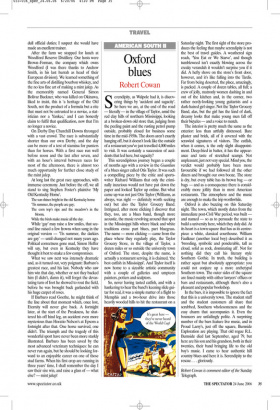Oxford blues
Robert Cowan
Serendipity, as Walpole had it, is discovering things by ‘accident and sagacity’. So here we are, at the end of the road — literally — in the village of Taylor, amid the red clay hills of northern Mississippi, looking at a broken-down old store that, judging from the peeling paint and the rusting petrol pump outside, probably closed for business some time in the mid-1950s. The doors aren’t exactly hanging off, but it doesn’t look like the outside of a restaurant you’ve just travelled 4,000 miles to visit. It was certainly a succession of accidents that led here, but sagacity?
This serendipitous journey began a couple of months ago with a review in the Guardian of a blues singer called Otis Taylor. It was such a compelling piece by the critic and sportswriter Richard Williams that only the criminally incurious would not have put down the paper and looked Taylor up online. But what came up was not just Otis Taylor (Williams, as always, was right — definitely worth seeking out) but also the Taylor Grocery Band. Intrigued, after more clicking I discover that they, too, are a blues band, though more acoustic, the music revolving around that spot in the Mississippi hills where black and white traditions cross: part blues, part bluegrass. The name — more clicking — came from the place where they regularly play, the Taylor Grocery Store, in the village of Taylor, a dozen miles or so outside the university town of Oxford. The store, despite the name, is actually a restaurant serving, it is claimed, ‘the best catfish in Mississippi’. And Taylor itself is now home to a sizeable artistic community with a couple of galleries and umpteen painters, potters and sculptors.
So, never having tasted catfish, and with a hankering to hear the band’s keening slide guitar for real, it was a simple matter of a flight to Memphis and a two-hour drive into those heavily wooded hills to hit the restaurant on a Saturday night. The first sight of the store produces the feeling that maybe serendipity is not the best of travel guides. A weathered sign reads, ‘You Eat or We Starve’, and though tumbleweed isn’t exactly blowing across the creaky verandah it wouldn’t surprise you if it did. A hefty shove on the store’s front door, however, and it’s like falling into the Tardis. Far from being deserted, the place, amazingly, is packed. A couple of dozen tables, all full; a crew of jolly, matronly women dashing in and out of the kitchen and, in the corner, two rather nerdy-looking young guitarists and a dark-haired girl singer. Not the Taylor Grocery Band, alas, but the girl has the kind of dark, dreamy looks that make young men fall off their bicycles — and a voice to match.
The interior is pretty much the same as the exterior: less than artfully distressed. Bare plaster and brick, all of it covered with the scrawled signatures of visitors. The catfish, when it comes, is the only slight disappointment. Deep-fried in batter, it has the appearance and taste of stretched scampi. Not unpleasant, just not very special. Mind you, the verdict would probably have been more favourable if we had followed all the other diners and brought our own booze. The store is dry, but every table has its brown bag — or bags — and as a consequence there is considerably more jollity than in most American restaurants. The atmosphere and the music are enough to make the trip worthwhile.
Oxford is also buzzing on this Saturday night. The town, which mostly dates from the immediate post-Civil War period, was built and named — so as to persuade the state to build a university here, which they duly did. At its heart is a town square that has as its centrepiece a white, classical courthouse. William Faulkner (another local boy) described it as ‘brooding, symbolic and ponderable, tall as cloud, solid as rock, dominating all’. Not for nothing did they call his literary style Southern Gothic. In truth, the building is rather squat but absolutely appropriate: you could not conjure up a more archetypal Southern town. The outer sides of the square are lined mainly with either lawyers’ offices or bars and restaurants, although there’s also a pleasant and popular bookshop.
In the bars, it is impossible to ignore the fact that this is a university town. The student staff and the student customers all share that scrubbed, Southern wholesomeness and the easy charm that accompanies it. Even the bouncers are unfailingly polite. A surprising number of the bars feature live music, and in Proud Larry’s, just off the square, Burnside Exploration are playing. That old rogue R.L. Burnside died last September, aged 79, but here are his son and his grandson, both in their twenties, their band bringing life to the old boy’s music. I came to hear authentic hill country blues and here it is. Serendipity to the rescue ... gloriously.



















































 Previous page
Previous page